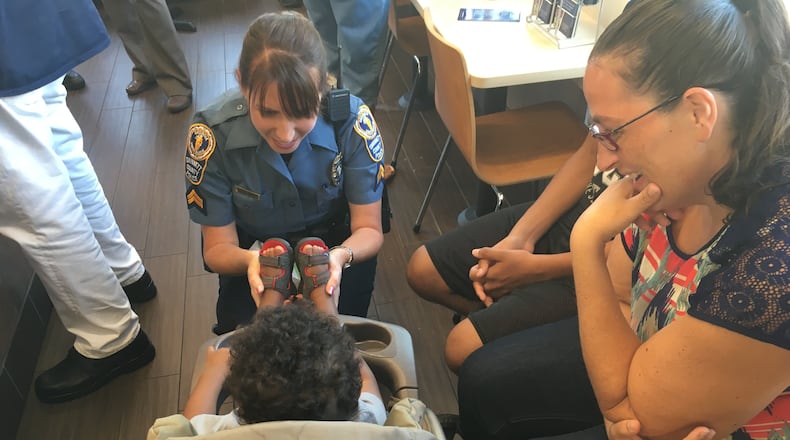Quinten Fulton is a 14-year-old black kid, and his mother is terrified.
She doesn't want him to be Philando Castile or Alton Sterling or Michael Brown or Tamir Rice, but she also doesn't know what to tell him, exactly. So she went to a Dunkin' Donuts in Dacula on Tuesday morning, where a gaggle of officers from the Gwinnett County Police Department were waiting.
"It definitely starts with communication and breaking down barriers," the mother, Kylee Fulton, said.
The Fultons were just two of many everyday people who stopped by the restaurant, where GCPD was hosting the latest in its series of "Coffee with a Cop" events. The goal, as always, was constructive and casual interaction between police and the community.
Tuesday's gathering was planned well in advance of the events of the last week-plus — Castile and Sterling's deaths at the hands of police officers in Minnesota and Louisiana, respectively, the slaying of five Dallas police officers and protests across the country — but they made the conversation even more poignant.
"It is an investment in our community," Gwinnett police Maj. Curtis Clemons said. "We want to show people we are human just like they are."
"The community needs the police department," he added later, "but more importantly the police department needs the community."
Since the shootings in Dallas, Gwinnett County law enforcement has seen an outpouring of support from the communities they serve. There was a similar theme Tuesday morning, with people like Auburn resident Judy Argo making it a point to hug every single officer she could find, and Dacula Mayor Jimmy Wilbanks stopping by to say thank you.
But there were also talk of the bigger picture.
Lamar Bankhead, a black man, visited the Dunkin' Donuts to ask police what he should tell young men like his nephews when they see videos of police shootings. He said officers told him, among other things, that Gwinnett County police don't discriminate.
Bankhead said he thinks the department does a good job overall, and was hopeful events like Tuesday's would help moving forward — but he also said there's more that everyday people can do.
"I think a little more interaction household-to-household is what's going to change things," he said.
About the Author
The Latest
Featured



